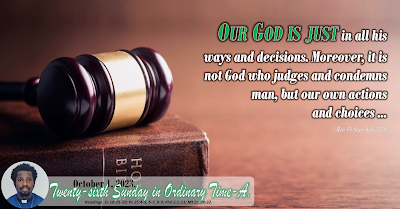GOD OF JUSTICE.
October 1, 2023.
Twenty-sixth Sunday in Ordinary Time – A.
Readings: Ez 18:25-28; Ps 25:4-5, 6-7, 8-9; Phil 2:1-11; Mt21:28-32.
“Is it my way that is unfair, or rather, are not your ways
unfair?” Ezekiel 18:25
A Sicilian proverb says: “The justice of God is better than
the justice of the world.” A Portuguese proverb adds: “Good words and bad acts
deceive both wise and wimple.”
Our God is just in all his ways and decisions. Moreover, it
is not God who judges and condemns man, but our own actions and choices.
Judgment is the fruit of human freedom and the choices he makes in life. He who
lives abiding by the Law of the Lord will be saved. He who goes against God's
Law, and most especially the law of love heads himself to damnation.
Last Sunday, the readings concord to tell us about God's way
and how it was different from our ways. Because God judges not according to
human merits, but his generous love and mercy. Today, the readings come to tell
us that, besides God's generosity, our choices also play in our salvation.
Because, though God is generous, man can, because of his freedom, refuse to
enter the salvation God gives.
Just like Isaiah in last Sunday's reading, Ezekiel, in
today's reading, presents the thoughts of many. Many people, in the time of
Ezekiel, but even today, find God's way unfair, and unjust. To them, the Lord
questions: "Is what I do unjust? Is it not what you do that is
unjust?" God does not want the damnation or loss of no one. It is our
choice to enter and accept or refuse his proposal. "When the upright man
renounces his integrity to commit sin and dies because of this, he dies because
of the evil that he himself has committed. When the sinner renounces sin to
become law-abiding and honest, he deserves to live."
The Gospel parable given by Jesus comes to prove how our
choices play for our salvation or damnation. The example of the two children to
whom their father addresses his invitation must call upon our attention. The
first said no, and later on, coming to conscience did as ordered by his father,
while the second said yes, but did not. A personal choice with its
consequences.
I read somewhere that what makes a man is his word. Not only
were we created by the word pronounced by the Lord (Genesis 1), but our words
also play a lot in our salvation. The Spanish expression "Palabra de
honor" fits quite well here. It is about a sense of truthfulness and
reliability. That, when we give our words, we have to honor them by fulfilling
our commitments even without any legal document. Moreover, our words are more
important than a notarized contract.
God, nevertheless, does not oppose our free will, our
freedom of choice and action. Coming back to the parable, the leaders of Israel
stand like the second son who said yes but did not. While the sinners,
publicans, tax collectors, and prostitutes appear to have said no through their
lifestyle, in fact, abide more by the Law of God than the leaders of the
people.
Jesus gives this parable to provoke the leaders of the
people. Let's look closely at the parable. Its contents: A father asks his two
sons to work in his vineyard. The first who was approached said he wouldn't,
but later on did. The second promised to obey with a yes but then did not. The
Lord, after a provocative question to his interlocutors (the Scribes and the
Pharisees), concluded: “Amen, I say to you, tax collectors and prostitutes are
entering the kingdom of God before you." This parable was targeting them.
He compares them to the second son who promised a Yes but did a No. While
sinners seem to have said no but repent for yes.
It is also a provocation and interpellation to you and me.
It is not enough to be a good churchgoer. It is not enough to have been
baptized, married in the church, appear good to others, or be a priest... what
about our life and relationship with each other and with God? That is what will
save us. The appearance betrays. As says the dictum, "the habit does not
make the monk."
St. Paul, in the second reading, presents us the easiest and
shortest way to correspond to God's will and be saved: love, unity, mutual
understanding, support, and selflessness. He advised: “Do nothing out of
selfishness or out of vainglory; rather, humbly regard others as more important
than yourselves, each looking out not for his own interests, but also for those
of others.” In one word, we should in everything imitate Christ’s humility. We
should be truly Christ-like. That is what it means to be Christian.
May we close our meditation with these words from the Catechism that calls for the childlike humility in order to be truly Christlike, able to call God “Abba”: “Before we make our own this first exclamation of the Lord's Prayer, we must humbly cleanse our hearts of certain false images drawn "from this world." Humility makes us recognize that "no one knows the Son except the Father, and no one knows the Father except the Son and anyone to whom the Son chooses to reveal him," that is, "to little children."30 The purification of our hearts has to do with paternal or maternal images, stemming from our personal and cultural history, and influencing our relationship with God. God our Father transcends the categories of the created world. To impose our own ideas in this area "upon him" would be to fabricate idols to adore or pull down. To pray to the Father is to enter into his mystery as he is and as the Son has revealed him to us. The expression God the Father had never been revealed to anyone. When Moses himself asked God who he was, he heard another name. the Father's name has been revealed to us in the Son, for the name "Son" implies the new name "Father."” CCC 2779





Comments
Post a Comment